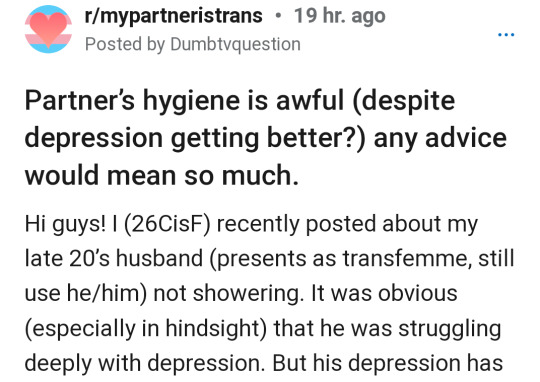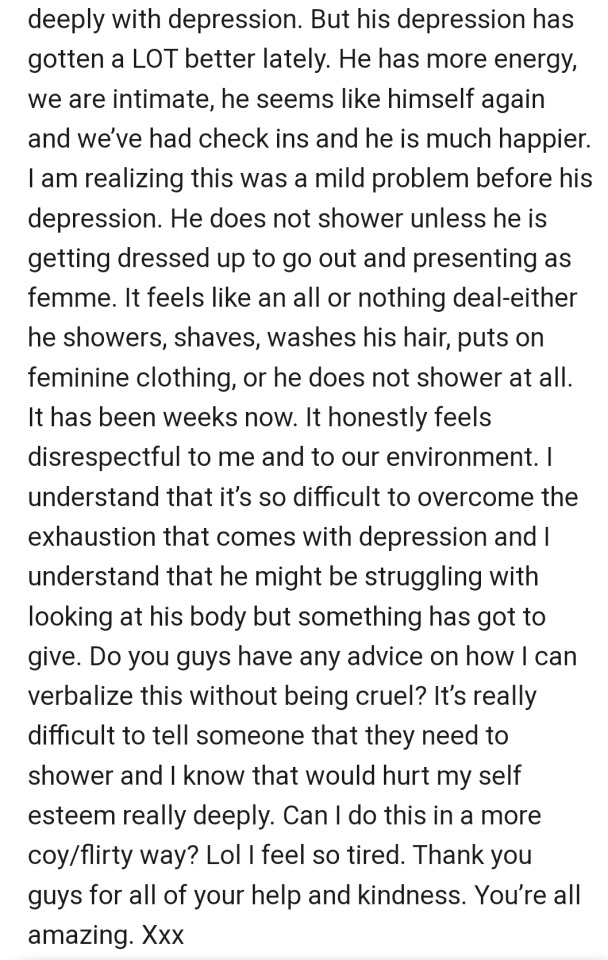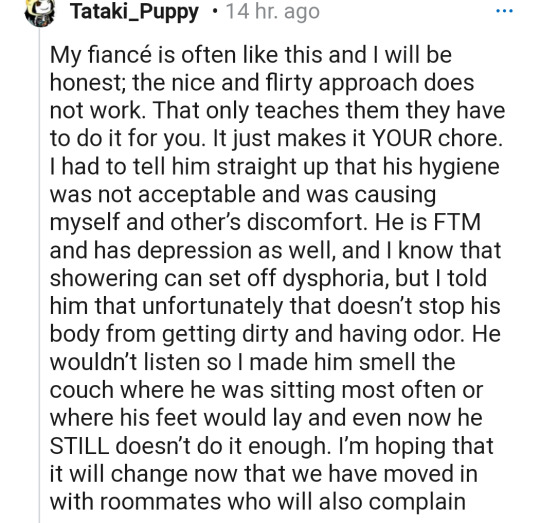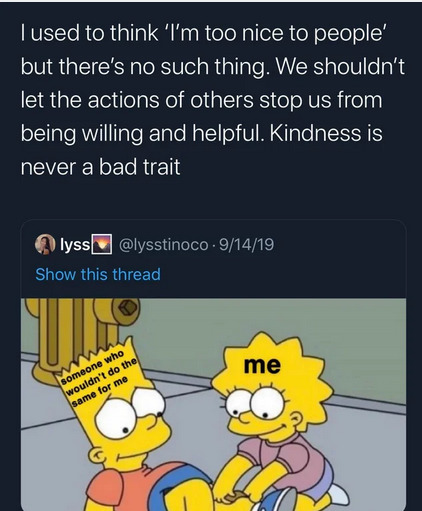#emotional labour
Text
There is in fact evidence that women in their fifties are more empathetic than men of the same age and younger or older people of either sex. Put together with the amount of unpaid labour this cohort takes on, it seems absurd that these women are so often characterised as less caring, less inclusive, less conscious of need and difference than younger women. ‘The thing about being a middle-aged woman,’ says Mary-Ann Stephenson, ‘is that your default role is to be the person who is kind and puts everyone else ahead of you and worries more about everybody’s needs than your own.'
– Victoria Smith (aka. Glosswitch), Hags: The demonisation of middle-aged women, p.119.
566 notes
·
View notes
Text
Hygiene should be a gender neutral practice




And yes she has suffered consequences of his inability to care for himself



She's doing the emotional and mental labor for someone who doesn't care that he is causing her infections.
85 notes
·
View notes
Text
“So few men – even among the proletariat – realize how much effort and trouble they could save women, even quite do away with, if they were to lend a hand in ‘women’s work’. But no, that is contrary to the ‘rights and dignity of a man’!
They want their peace and comfort. The home life of the woman is a daily sacrifice to a thousand trivialities. The old master right of the man still lives in secret. His slave takes her revenge, also secretly."
Lenin telling the world that Marxism and Feminism are when you do the laundry and the dishes.
You.
Not just your wife or girlfriend.
1920.
#lenin#marxism#feminism#emotional labour#labor#misogyny#communism#1920s#we've been discussing this for 102 plus years#gender roles#toxic masculinity#gender binary
9 notes
·
View notes
Text

From r/wholesomememes. Absolutely based.
#me#personal#mental health#forgiveness#altruism#positivity#nice#giving#giver#goodness#mutual aid#anarchism#emotional labour#helpful#queue are lovely
26 notes
·
View notes
Text
We know that women in opposite sex marriages pick up the bulk of the domestic responsibilities. According to the European Institute for Gender Equality, 91 per cent of women with children spend at least an hour per day on housework, compared with 30 per cent of men with children. That’s despite 72.3 per cent of women being in work. Women pick up most of the caring responsibilities at home, looking after children, aging parents, and their partners.
It is women who do most of the “cognitive labour” at home, which was defined in the American Sociological Review as the responsibility of “anticipating needs, identifying options for filling them, making decisions, and monitoring progress”. This is not to say that men don’t also fulfil these duties, of course they do, but it is overwhelmingly women who take these tasks on, often alongside working full-time themselves.
read without a paywall
#article#marriage#happiness#demographics#gender equality#emotional labor#emotional labour#cognitive labour
5 notes
·
View notes
Text

The entire history of emotional labour summarized in a single panel.
[Lee, Stan (w), Jack Kirby (p), and Sol Brodsky (i)]. “The Menace of the Miracle Man!” The Fantastic Four #3 (Mar 1962). The Fantastic Four Omnibus, vol 1. Eds. Corey Sedlmeier and Mark D. Beazley. Marvel: 2022 (Digital).
#Fantastic Four#The Fantastic Four#Sue Richards#The Invisible Girl#Marvel#Marvel Comics#Stan Lee#Jack Kirby#comics#comic art#feminism#emotional labour
4 notes
·
View notes
Text
"Since the Wages for Housework movement expanded the terrain of 'work' many other activities that would not typically be considered work have been described as such. These acts of re-labelling are often inspired by the work of sociologist Arlie Hochschild. Hochschild's 1983 The Managed Heart described how certain jobs involve the management of a worker's own internal emotional states. Air hostesses, for example, are expected to present a particular kind of demeanour regardless of whether their parent has just died or whether the plane is about to crash. This, as you can imagine, takes an emotional toll. The idea of this kind of effort - 'emotional labour' - has been applied to all kinds of activity, both waged and non waged. Gemma Hartley, an American journalist, describes the mental toll of women remembering birthdays and shopping lists as 'emotional labour', for example. Elsewhere, explaining political ideas, tweeting, and supporting one's friends or partner has been described as 'emotional labour'.
When these claims to work'are made, it's hard to know exactly what is being suggested. In some cases, the demand seems to be for compensation. In others, it's the acknowledgement and redistribution of an unfair and gendered distribution of effort. Generally, the underlying intention seems to be showing that a given activity requires effort in cases where that effort is hidden. The effects of making obvious something that has been naturalised and invisibilised can be powerful and helpful in making arguments about social justice, but I'm not convinced that it's always helpful to talk about these activities in terms of 'work', at least not without some further clarifications, because the confusion about what exactly claims to work' should result in causes all kinds of difficulties. Hochschild, too, has pushed back against the expansion of the idea of 'emotional labour'.
This doesn't mean the paradigm of work has nothing to add in such cases. But it does seem like there is a distinct activity - work - through which capitalists, as a class, profit from the efforts of workers as a class. One important part of this activity is that the employers will always attempt to maximise their profits, which means they have a particular political relationship with their employees: one of control, of power over, and of surveillance and performance management. While unpaid socially reproductive work in the home shares some features with waged work, this direct relation of power is not present.
Social reproduction theory allows us to see how different kinds of societies and different regimes of capitalist exploitation reproduce themselves. It and other contestations of the nature and status of 'work' represent important critical additions to Marx's account of work. It is easy to assume that finding something that looks like a gap in Marx's theory means he has somehow been disproved; that in failing to account for XYZ, he is no longer relevant. This is the kind of thing that right-wing critics enjoy doing. A big 'well actually' on every page or, more politely, hidden into a footnote. The reality is that no theory is static or should be allowed to remain so. To say that there is something not present doesn't mean the whole idea comes tumbling down. What we inherit from past thinkers are critical frameworks, ways of diagnosing societal ills, and attempts to cure them - both theoretically and practically."
-- lost in work : escaping capitalism, amelia horgan
12 notes
·
View notes
Text
emotional labour is the new favorite phrase of feminists, I've noticed. The way they whine and cry that their boyfriend doesn't think about stuff/doesn't organize anything/that it's all up to them to remember their anniversary, their kids' birthday, that it's all up to them to create meaningful moments in their relationship and to keep the family together.
boohoohoo You married/are a dating a man. That is your choice. Spare me this nonsense.
A friend of mine has started complaining about this too. I pretend to give a shit because If I were to actually say out loud what I truly think, I'd be left with nobody in my life. I'm strong but not that strong. I don't want to be a pariah.
Anyway, these women don't want actual solutions. They want bandaids for their self-inflicted problems so that they can continue being in their heterosexual relationships and continue breeding more men.
#pass#I'm tired and I'm bored#charge mentale#la vraie charge mentale c'est de devoir écouter leurs chouineries#emotional labour
2 notes
·
View notes
Quote
I so automatically but actively expended effort to do all of this emotional labour that I chalked up the sleep and fatigue thing to a personality trait. I’m not like this when engaging with groups where I belong, rather than fit in.
I continue to reflect on that.
#writing
5 notes
·
View notes
Text
I want to be able to choose to be kind
But it is so exhausting and I have bills to pay
6 notes
·
View notes
Text
In another study, married women were matched within an equal number of of women who were divorced or separated. In the married group, marital quality and satisfaction were assessed by means of self-reports. Immune system activity was studied in blood samples drawn from each participant. Poorer martial quality was "strongly and positively" related to poorer immune response. In the divorced or separated group, the two psychological factors most closely associated with diminished immune functioning were the time elapsed since the breakup (the more recent the marriage failure, the greater the immune suppression) and the woman's degree of attachment to the former spouse (the greater the emotional attachment, the worse the immune function). Women who were more self-regulated, less emotionally dependent on a relationship that failed to work for them, had stronger immune systems. Greater differentiation means better health.
The less powerful partner in any relationship will absorb a disproportionate amount of the shared anxiety—which is the reason that so many more women than men are treated for, say, anxiety or depression. (The issue here is not strength but power, that is, who is serving whose needs?) It is not that the women are more psychologically unbalanced than their husbands, even though the latter may seem to function at higher levels. What is unbalanced is the relationship, so that the women are absorbing their husband's stress and anxieties while also having to contain own.
[...] The partner who must suppress more of his or her own needs for the sake of the relationship is more likely to develop physical illnesses well—hence the greater incidence, for example, of autoimmune disease and of non-smoking-related cancers among women. "The existence a mind-body link and a person-person link means that it is possible for anxiety in one person to be manifested as a physical symptom in another person," Dr. [Michael] Kerr writes, "As is the case with the emotional dysfunctions, the one prone to develop symptoms is the spouse who adapts most to maintain harmony in the relationship system."
– Gabor Maté (2003) When the Body Says No: The Cost of Hidden Stress, pp. 195-6.
#gabor mate#when the body says no#health#relationships#male privilege#emotional labour#feminism#radical feminism#patriarchy#lilac posts
9 notes
·
View notes
Quote
I so automatically but actively expended effort to do all of this emotional labour that I chalked up the sleep and fatigue thing to a personality trait. I’m not like this when engaging with groups where I belong, rather than fit in.
I continue to reflect on that.
https://medium.com/the-brain-is-a-noodle/boxing-day-haul-pay-attention-not-money-f1d6939e557c / #writing
2 notes
·
View notes
Text
If you’re doing his laundry, tidying up after him, planning his social calendar, having to remind him to practice basic hygiene, and cooking his meals for him, baby girl -- you’re not his woman, you’re his mother.
0 notes
Text
UGH why do men
#im so angry and i dont even know why im so angry. lol#effort. put in effort#the lack of emotional intelligence#yknow its worse when they try to explain like#oh i know what im doing i just refuse to change#like oh? so youre making me suffer on purpose?#says idk why and proceeds to list reasons...#anyway#emotional labour
0 notes
Text
My mother's guilt
I want to help. I do. But then i'm just part of the cycle. it's not fair.
The cycle is ending with me. In my home we do equal work. He cooks I wash up. We both clean. We ask the other to help or to pull their weight. It's even.
Yet I come home and it's just you. I want you to be able to relax to have food made for you, to have the chores done so you can relax after work. Yet no one does. I want to help lighten your load. But I don't live here why should I wash my father's pants and my brothers hoody. Why can't they see how much work you do. My sister is new to womanhood. She has not yet learned the guilt. How can she not see how tired you are. How can she just ignore it.
My dad loves my Mum. But he's tired after work and just wants to relax. Why doesn't he lighten her load. My partner does for me. It's not hard to love someone so much you want to make their life easier. So how can he not.
So i'll help. Because I see you need a break. Because you ask for my help. But I can't stay here doing the work of three kids. You deserve better. But so do I.
#writeblr#writing#creative writing#writer#writers on tumblr#my mothers daughter#my mother#womens labour#emotional labour#fran ansley was right and i have never forgotten a level sociology#fran ansley#feminism#womens rights#male privilege#chores#adulting#mothers guilt#i want to help#save my mum
0 notes
Text
Quintessential afab experience is being held responsible for other people's actions and being expected to fix the relationship with the person who hurt you because they're "not as mature as you".
Which usually means because they're a boy or mentally ill or neurodivergent or have an addiction or something else that your family as a collective goes "well they're suffering so we can't be upset at them if they hurt us"
And this is regardless of if you have the same problems just do not hurt people as a way to cope with them.
Obviously there are different complex situation stuff but like currently just really tired of having to do emotional labour for people who are 30+ years older than me that treat me like a child for living at home because rent isn't cheap.
#afab#rant#emotional labour#idk#words man#I'm just tired#my dad yelled at me because I was going to bed after being at uni all day and calling me lazy#I don't remember the first apology he did#the second he called me lazy so I just ignored it#the third he was with my mother and looked at her the whole time and did the I'm sorry I hurt your feelings because I called you a lazy ass#In which I went thats not an apology#Insulting people does not equal an apology#I shouldn't have to be an adult in this situation#literally the only reason my father and I had a relationship was because I started inviting him out for marevl movies#“This needs to be a two way street”#who do you think paved the street in the first place????#Goddamn#the daddy issues continue
0 notes